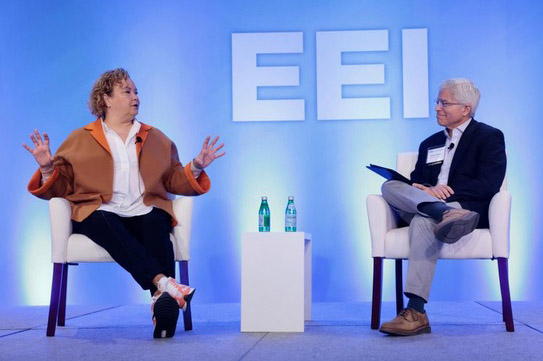AMELIA ISLAND, Fla. (January 12, 2024) — At the winter Edison Electric Institute (EEI) Board of Directors and CEO meeting Wednesday, Lisa Jackson, Apple’s vice president for Environment, Policy and Social Initiatives, discussed how companies can advance clean energy and set strong climate goals.
 “The electric power industry is working hard to help ensure that more corporate leaders like Apple can reduce their carbon footprint and completely electrify operations,” said EEI Chair Pedro J. Pizarro, president and CEO of Edison International, who led the discussion. “Electric companies have invested more than $1 trillion over the last decade to modernize and expand the energy grid. Coordinating our efforts with Apple and other major corporations is vital for meeting our shared climate goals.”
“The electric power industry is working hard to help ensure that more corporate leaders like Apple can reduce their carbon footprint and completely electrify operations,” said EEI Chair Pedro J. Pizarro, president and CEO of Edison International, who led the discussion. “Electric companies have invested more than $1 trillion over the last decade to modernize and expand the energy grid. Coordinating our efforts with Apple and other major corporations is vital for meeting our shared climate goals.”
During the discussion, Jackson outlined Apple’s commitment to being carbon neutral across its entire supply chain and the lifetime use of every product by 2030. She also shared her perspective on the important role electric companies will play in the years ahead, as demand for renewables continues to increase. Apple has sourced 100-percent renewable energy for its worldwide facilities since 2018 and is committed to matching all of the energy customers use to charge their Apple devices with clean electricity by the end of this decade.
“The power sector has a pivotal role to play in ensuring a climate transition that is both rapid and just,” said Jackson. “Electric companies have helped spur major growth in wind and solar—now is the time to supercharge that progress with more renewable capacity, greater grid flexibility, and better data, all while meeting the needs of communities on the frontlines of climate change. The future of electricity is clean—let’s work together to get there.”
Jackson and Pizarro emphasized the importance of electric companies understanding their corporate customers’ five- to 10-year planning cycles, including long-term demand for clean energy. This level of coordination requires customers to take a more proactive role to ensure that electric companies have a clear understanding of future energy needs. Additionally, the discussion pointed to the need for policy that ensures infrastructure needs are met affordably and reliably. The two leaders also underscored the importance of equity in the energy transition; of working to ensure that communities be included in key decision-making processes; and that energy providers, buyers, and users can all benefit from investments in clean energy.
Jackson also discussed her involvement with America Is All In (All In), which she co-chairs. All In is the most expansive coalition of leaders ever assembled in support of climate action in the United States and is made up of thousands of U.S. cities, states, tribal nations, businesses, schools, and institutions of faith, health, and culture. All In promotes an all-of-society approach to climate action and the vital role that businesses can play in these efforts.

 “The electric power industry is working hard to help ensure that more corporate leaders like Apple can reduce their carbon footprint and completely electrify operations,” said EEI Chair Pedro J. Pizarro, president and CEO of Edison International, who led the discussion. “Electric companies have invested more than $1 trillion over the last decade to modernize and expand the energy grid. Coordinating our efforts with Apple and other major corporations is vital for meeting our shared climate goals.”
“The electric power industry is working hard to help ensure that more corporate leaders like Apple can reduce their carbon footprint and completely electrify operations,” said EEI Chair Pedro J. Pizarro, president and CEO of Edison International, who led the discussion. “Electric companies have invested more than $1 trillion over the last decade to modernize and expand the energy grid. Coordinating our efforts with Apple and other major corporations is vital for meeting our shared climate goals.”